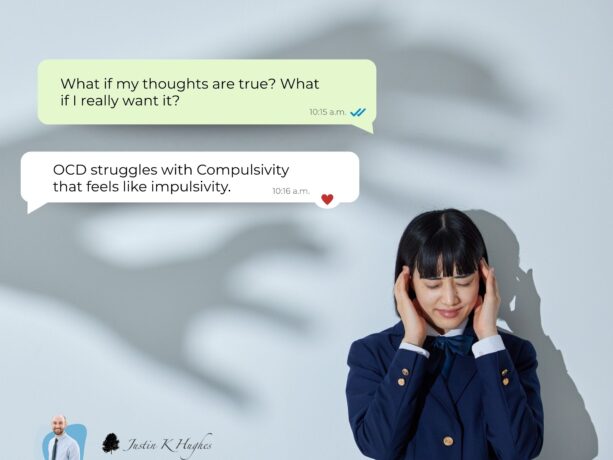
“You want me to do what?!”
Many of my clients, and particularly for the sake of this article, Christian clients, are a bit surprised when I ask them to practice exposure. Repeating scary, terrible thoughts on paper or aloud. Doing things that feel risky. It seems as a clinician I’m disrespecting your beliefs and don’t really get it. Maybe I’m asking you to do something unbiblical, blasphemous, against what God would want. But what if I do understand and am helping you live in line with your beliefs? What if exposure is a powerful tool under God’s grace (Matthew 5:45) to help you get over a disorder?
The Great Hesitation
- What if I really am at risk of doing this thing I fear? Won’t exposure make it worse?
- Are you asking me to do something that could go counter to my faith?
- Don’t I need to avoid this thing rather than giving it more credit?
- Isn’t this a spiritual problem? Shouldn’t I pray more about this?
- Isn’t this Satan telling me lies?
- If I have “bad thoughts” (thoughts of harming someone, making someone or myself sick, perverted sexual thoughts), shouldn’t I be on guard? Flee temptation?
Maybe. I of course do not know your (the reader’s) story, so I cannot say for you personally. Though, here’s the problem many of my clients run into: they are reinforcing fear every time they avoid and run from thoughts/urges/impulses/feelings that are out of fear rather than a want (see an important article on this for more: FACE fear, FLEE Temptation). Some basic science is in order here: when you fight and resist a thought, it persists (e.g., don’t think of the pink elephant, trying to get a song out of your head, etc.). That’s the way it’s supposed to work- a threat believed to be a threat is supposed to feel like a threat.
This Is Where Exposure Therapy Comes In
- “I’ll be responsible for my child’s death.”
- “I’ve picked the wrong person to be with.”
- “Maybe that bump I heard in my car was a person. Should I check to see if they’re okay?”
- “Was I just attracted to a dog? Did I just get turned on?”
- “I must not believe in God because I feel numb when I say His name.”
- “What if I just get up and run into oncoming traffic?”
The above are examples of intrusive thoughts; they are counter to what a person holds as their overall value and pursuit, or “ego-dystonic.” If you want to know all about treating these thoughts through imaginal exposure, check out the article “Flip the Script- A Guide to Imaginal Exposure.” And yes, I’ll tell you right now that if a person obsesses on the above or has ritualistic behaviors and avoidances, we are going to work with leaning into the discomfort of these, not ignoring them.
The Clinical Rationale
- If you have ever thought someone nefarious was following you, you might have felt fear, suspicion, anger.
- If a child cries after something you say, you might would feel sadness, regret, or shame.
- When you say something socially that is a ‘miss,’ you might think you’ve totally embarrassed yourself.
When is a time you felt something strongly that turned out to be fine?
In disordered behavior, people become over-focused (or under) on a narrow set of experiences. People who are overly vigilant can run into some of the very problems they seek to avoid, or a different set of problems. Examples:
- If you repeatedly fear you might say something wrong and avoid talking in social settings, in time others may actually start to avoid you or stop talking to you altogether since they can’t have a conversation with someone who won’t engage them!
- Overwashing and cleaning the body leads to less resistance to germs, increased cuts and open skin with greater risks of various health problems.
- Spiritually, a person who compulsively prays that they will be kept safe will be over-focused on small details (saying a certain thing a certain way, fearfully repeating the same thing, or maybe focused on only a narrow scope of safety like driving, contamination, or health). This will lead to loss of seeing the bigger picture.
The Biblical Rationale
Truth is very important in the Christian faith (John 17:17; Psalm 145:18; Proverbs 12:22; John 4:24; 1 Corinthians 13:4-6). If part of being the church of Christ is to speak the truth to one another, including difficult things like anger (Ephesians 4:15, 26), I remind clients often that if you have intrusive, obsessive, or otherwise bothersome thought or feeling, being open about them and calling them out is simply being honest. It’s being truthful. God knows what’s going on in your head (1 John 3:20)!
When Philippians 4:8 is brought up, it is sometimes a “proof text” on how you “should always thinking positive.” That’s a remarkably short-sighted, superficial view.
“Finally, brothers, whatever is true, whatever is honorable, whatever is just, whatever is pure, whatever is lovely, whatever is commendable, if there is any excellence, if there is anything worthy of praise, think about these things.”
This clearly can’t mean to not think about negative things, evil, or something terrible. If so, we’d never be able to ask forgiveness of our sins by calling them out and repenting! One of the ways that we can think on things like justice, honor, love, etc. is by calling out the opposite: injustice, dishonor, and selfishness. It is in acknowledgement of problems that the solution can be instilled.
God knows our hearts (Proverbs 21:2; 1 Samuel 16:7; Jeremiah 17:10; Acts 15:8; Romans 8:27). If you’re afraid you might do something bad, do you believe God knows that? And if you’re going to do something bad and be unrepentant, then you aren’t going to repent, right? And if that’s the case, why are you trying? If you’re doomed, what’s the point in trying to change that? If there’s a chance- even if you don’t feel like it in the moment- just a small chance that you can take to God your innermost thoughts and feelings and get love and grace and forgiveness and peace and patience, is it worth it to you? Would you be willing to try?
Walking with God means we are “…casting all your anxieties on him, because he cares for you” (1 Peter 5:7). Nowhere in the Bible does it say you will not feel anxiety or struggle with anxiety. It tells us how to frame it (1 Peter 5:7; Philippians 4:6-8), that fear is not God’s heart for us (1 John 4:19), and that he loves us in it (each of these references prior reflects God’s gentle, patient love). The Bible is not a psychology textbook or methods and techniques class. While we walk with Christ, we learn to depend on God by faith. Sometimes that’s therapy, medication, prayer, community, repentance, exercise, gratitude, acceptance, rest, or any number of things.
Obviously, we are not going to find a passage that says, “do exposure therapy” (and of course, “pay good money for it”, ha!).
Compassion and Understanding to You
“For he makes his sun rise on the evil and on the good, and sends rain on the just and on the unjust” (Matthew 5:45 b, ESV).
“…He cares for you” (1 Peter 5:7b).
https://www.christianitytoday.com/edstetzer/2013/april/mental-illness-medication-vs-spiritual-struggles.html
https://www.thegospelcoalition.org/article/psychiatric-medication-and-the-image-of-god/
https://mentalhealthgracealliance.org/christian-mental-health-and-mental-illness/is-it-ok-for-a-christian-to-take-antidepressants
https://www.gotquestions.org/Christian-anti-depressants.html








Leave a Reply